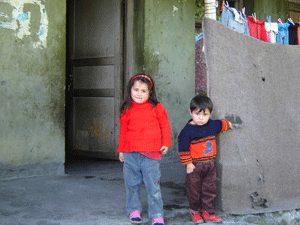Gela Mtivlishvili, Kakheti
 In accordance to the Article 28 of the UN Convention on the Rights of the Child, every state is obliged to ensure accessibility to education for refugees. Right to education is ensured by Law of Georgia on Refugees too. Executive and local authorities are entitled to support refugee children to get education at nursery and public schools. Despite that, refugee children from Chechnya do not go to school.
In accordance to the Article 28 of the UN Convention on the Rights of the Child, every state is obliged to ensure accessibility to education for refugees. Right to education is ensured by Law of Georgia on Refugees too. Executive and local authorities are entitled to support refugee children to get education at nursery and public schools. Despite that, refugee children from Chechnya do not go to school.
According to Akhmeta district resource center, five public schools are working in Kist villages of Duisi, Tsinubani, Birkiani, Dumasturi and Jokolo in Pankisi Valley. Currently, most refugee children go to two of those schools in the village of Duisi and Jokolo. Schools in these villages have Russian sector and it is funded from the Ministry of Education and Science of Georgia.
Pankisi Valley has bad climate in winter for what children cannot attend lessons; consequently, they cannot get adequate education. There is only primary school in the village of Tsinubani. In order to get secondary education refugee children have to go to school in the next village of Duisi. There is 5 kilometers between Tsinubani and Duisi. Children will have to walk this distance; since neither government nor other organizations have appointed buses for children; most adults cannot go to school. The road between the villages is very dangerous because as refugees claim children saw wolves on their way to school and hardly escaped the danger.
Article 22 of the 1951 Convention on Refugee Status states: “Member states shall create similar conditions for refugees as for their citizens in the field of education.” We have already mentioned above, that the education of refugees is guaranteed under Article 7, Paragraph “f” of the Law of Georgia on Refugees which states: “State agencies and local authorities must assist in placing children at the state day care centers and educational institutions.” Despite legislative obligations the Ministry of Refugees and Accommodation and local authority has done nothing to eradicate transportation problem for refugee children so far. The Minister of Refugees and Accommodation Koba Subeliani stated the problem is within the competence of the local authority.
Akhmeta district governor Koba Maisuradze said the district administration tries to resolve problem of transportation for refugee children. “We will envisage corresponding funds in the next year budget. Besides that UNHCR promised to give mini-buses for the purpose,” said the governor.
Leaving school early by refugee children is one more problem for schools. The reason is early marriages, and inability of refugees to buy clothes and text-books. Mostly 12-16-year-old girls tend to leave school. The UNICEF is also concerned about the fact which states the rights of refugee children are not protected properly who live in remote refugee settlements; it hinders children’s development.
According to the census of Chechen refugees carried out by the UNHCR, many are mentally disabled among refugee children in Pankisi Valley. In 2005 Norwegian Refugee Council launched pilot project which was about inclusive education of refugee children. However, the project faced problems. Four school children and five adults were involved in the project. According to the Norwegian Refugee Council this project was not successful because of two reasons: first- having mentally disabled child is very shameful in Chechen society and parents prefer to have him/her at home; second – tuition classes did not last all day long and food for children was not envisaged in the project. Consequently, disabled refugee children in Pankisi Valley cannot get education at all.



